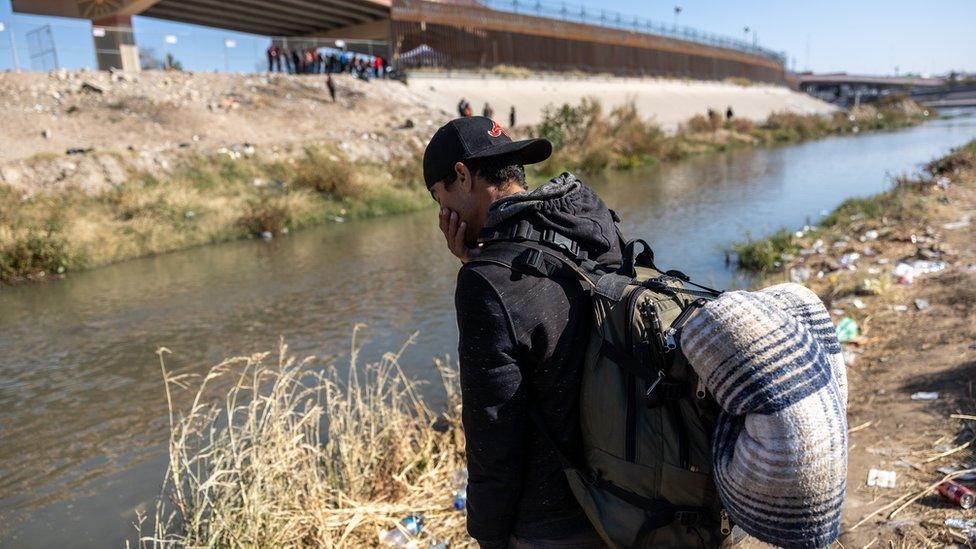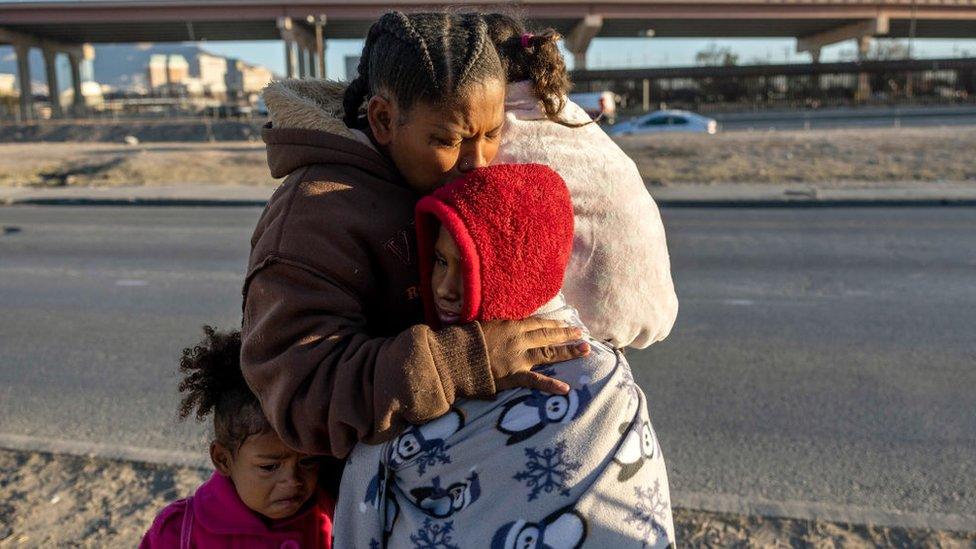Title 42: US Supreme Court keeps Trump-era border policy in place
- Published

An asylum-seeking migrant crossing the Rio Bravo river from Mexico last week
The US Supreme Court has voted to keep in place a controversial Trump-era policy that blocked thousands of people from crossing the US-Mexico border.
Title 42 gives the government power to automatically expel undocumented migrants seeking entry.
The potential lifting of the policy had prompted concerns that the number of migrants at the border would rise.
The Biden administration said it would comply with the ruling but called for reform of immigration policy.
"We are advancing our preparations to manage the border in a secure, orderly, and humane way when Title 42 eventually lifts and will continue expanding legal pathways for immigration," it said in a statement, external.
Bill Cassidy, a Republican senator for Louisiana, said removing Title 42 "would have made our border crisis worse, and the White House seemed willing to let that happen".
"Glad to see the Supreme Court step in to preserve it, but we need a permanent solution," he said on Twitter., external
Miguel Colmenares, a Venezuelan migrant in the Mexican border city of Tijuana, said: "It breaks my heart that we have to keep waiting."
"I don't know what I'm going to do, I haven't got any money and my family's waiting for me," the 27-year-old told Reuters news agency.
The Title 42 policy - applied about 2.5 million times since March 2020 - was originally due to expire on 21 December but, two days before the deadline, Chief Supreme Court Justice John Roberts blocked its termination.
The court's decision was in response to an emergency appeal from some Republican-led states who had asked for the policy to remain in place.
On Tuesday, the Supreme Court voted 5-4 to extend the temporary stay ordered by Justice Roberts while the case moved forward.
Additionally, the nine Supreme Court justices will hear oral arguments on whether the states can intervene in defence of the policy.
Arguments are likely to take place in February or March 2023. A decision is due by the end of June.
The decision will be a blow to immigration activists, who had sued to end Title 42, arguing it was contrary to international obligations to give people asylum.
Proponents of Title 42 and officials in many border communities, however, argued that lifting the policy would lead to an increase in arrivals at the border, putting a strain on resources.

In court documents filed last week, Solicitor General Elizabeth Prelogar said the government recognised that the end of Title 42 orders would probably "lead to disruption and a temporary increase in unlawful border crossings".
"The government in no way seeks to minimize the seriousness of that problem," she added. "But the solution to that immigration problem cannot be to extend indefinitely a public-health measure that all now acknowledge has outlived its public-health justification."
On the border, local governments and humanitarian organisations have warned that they are already overburdened and ill-prepared for an additional influx of asylum seekers.
In the Texan city of El Paso, for example, authorities last week declared a state of emergency and set up a makeshift 1,000-bed shelter in the city's convention centre as part of a wider plan to cope with the growing number of asylum seekers on the city's streets.
Speaking to the BBC last week, officials in the city had expressed concern that they would be unable to handle a significant increase in the number of people that need food, shelter and help arranging transport further into the US.
Susan Goodell, chief executive of El Pasoans Fighting Hunger Foodbank, said local non-governmental organisations had been told to expect "additional spikes" if Title 42 was lifted.
Watch: Migrants feeling anxious as US border restrictions remain
- Published20 December 2022

- Published21 December 2022
